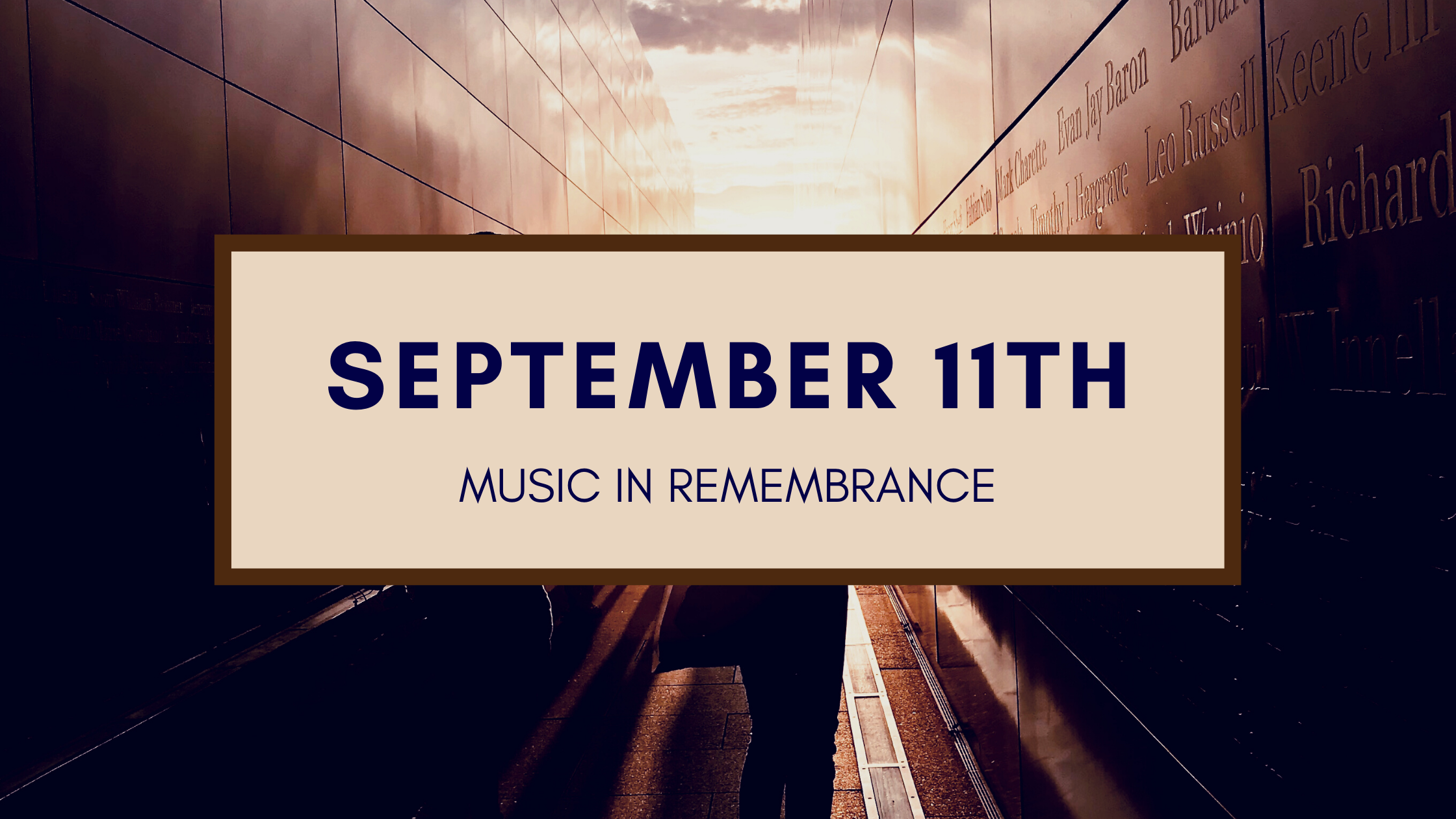Music in Remembrance: September 11th


The terrorist attacks of September 11, 2001 set in motion events that would change the course of life in the U.S. and around the world. The cultural influence of that day is not nearly as significant as its unspeakable death toll, but it saw the United States come together in acts of patriotism and community. Thousands donated blood, enlisted in the military, and mourned together; and in the wake of the tragedy, music was created. It is thought-provoking to look back on the ways in which these attacks sparked a wave of music that is still one of our most significant ways to remember and commemorate those who died.
Trinity Requiem
Composer Robert Moran was commissioned by Trinity Wall Street to write a piece for their youth choir for the 9/11 anniversary. It truly is angelic— made for young voices, harps, and cellos, and was inspired by the grief found in not just these attacks, but war zones all over the world.
Elevator
This song by Box Car Racer was written from the perspective of someone who jumped to his death from the World Trade Center when it was attacked. While particularly upbeat, its lyrics help us think about how awful the event really was.
The building turned it's back Ignored my call The concrete looks too thin to break my fall The sunset stretched across this night time scene I counted people as I neared the street below, whoa, below, whoa I saw it all, I saw it all go down The shadow grew as he approached the ground The sunset stretched across this night time scene I turned away as he came near the street, below, whoa, below, whoa, below
Sacrificed Sons
Using real fragments of news from September 11th, The Dream Theater released an emotional ballad in 2017 that was made to commemorate the day. The first half is a reflective and sentimental melody that progresses to an undirected instrumental section that is meant to represent the chaos and confusion that reigned that morning. The song starts with a slow tempo and gradually builds until it gets to the climax, where they sing “towers crumble, heroes die,” It so clearly shows the anger, confusion, and sorrow from the day, all in just one song.
Real Life
This song references several tragic moments in American history. Using lyrics like “Prays on her knees as the towers fold,” which is a reference to the 9/11 attacks, they describe people’s loss of assurance in their faith and religion after such a tragedy.
She prays on her knees as the towers fall To a god she does not know She's begging him to stop the mess As the Boston bombs will blow (Ooh) She says, "How could I ever believe in something That would step aside and watch?" And I got no words to say 'cause I think I lost my faith But I fake it for the day, oh, everything will be okay
A survey done after 9/11 showed that hundreds of people that were religious before the event lost faith in it when they witnessed the deaths and losses that occurred, almost questioning aspects of it.
Courtesy Of The Red, White And Blue (The Angry American)
Artist Toby Keith wrote this song after his father died during the attacks. A piece written to show how the United States prevailed over evil, Keith writes this in quite a violent way, with lyrics like “the Statue of Liberty started shaking her fist” and “justice will be served and the battle will rage,” His anger, which is present in hundreds of American’s hearts following the event, is well displayed in the song.
Me and The Sky
Suddenly I'm flying Paris to Dallas Across The Atlantic and feeling calm When suddenly someone on air to air traffic says "At 8:46 there's been a terrorist action" And the one thing I loved more than anything was used as the bomb
This song from the Broadway Musical “Come Away” describes the story of a pilot during the time of the attack. The pilot described is Beverly Bass, a pilot flying from Paris to Texas, who was unable to land in the United States after all air travel was closed following the attack.
United 93
United 93, remember their names Come tell of the time on that great silver plane The bravest band of travellers that ever flew the sky Said “We’re bound to fight ‘cause we know we’re bound to die.”
This song by Jack Warshaw commemorates the 182 passengers on the flight that lost their lives after fighting for control of the plane. The flight was originally travelling from New York to San Francisco, but was hijacked and crashed in a field in Pennsylvania. A simple, acoustic tune, its biggest emphasis is not on the music itself, but on Warshaw’s words respecting those who were killed.
A Hymn For the Lost and Living
Composer Eric Ewazen described this solemn piece as portraying “those painful days following September 11th, days of supreme sadness.” The composer was teaching a class at the Julliard school when the events happened, and in the piece he characterizes not just the extreme sorrow and grief that took over the United States after the events unfolded, but the realization of the gravity of the situation that not just him, but hundreds of others felt.
It’s been 19 years since this horrific event and many are still reeling. Chords for a Cause encourages you to not just remember the event and honor the lives lost, but to also lend a hand to your neighbor or do something kind for someone. This is a much greater and more meaningful legacy in the post-9/11 era than the hate and anger that has also been created.

